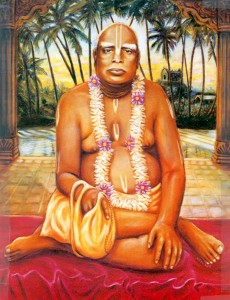
Srila Bhaktivinoda Thakura was an inspirational figure in the history of Gaudiya Vaishnavism and his ideal utilization of time stands as a tall standard for followers to emulate.
08:00 pm – 10:00 pm Rest
10:00 pm – 04:00 am Write
04:00 am – 04:30 am Rest
04:30 am – 07:00 am Chant Japa
07:00 am – 07:30 am Correspondence
07:30 am – 09:30 am Study Shastra
09:30 am – 10:00 am Bathe, take simple prasadam
10:00 am – 01:00 pm Court duties
01:00 pm – 02:00 pm Refresh at home
02:00 pm – 05:00 pm Court duties
05:00 pm – 07:00 pm Translate Sanskrit Sastras to Bengali
07:00 pm – 08:00 pm Bathe, take simple prasadam



Srila Bhaktivinoda Thakur was a highly efficent utilizer of time. He was assigned the District Magistrate of Jagannath Puri in the year 1870 by the British Government. In that period Srila Bhaktivinoda Thakur could make humanly impossible accomplishments. Between the years 1874 and 1893 Thakura Bhaktivinoda wrote several books in Sanskrit such as ‘Sri Krishna-samhita’, ‘Tattva-sutra’, and ‘Tattva-viveka’ which was sometimes known as ‘Sac-cid-anandaubhuti’. He also wrote many books in Bengali such as his ‘Kalyana-kalpataru’ and besides those, in the year 1874, he composed his famous Sanskrit work ‘Datta-kaustubham’. Besides these stupendous accomplishments, he used to chant the Holy Name of Krishna with great faith and love for long periods in seclusion. All this was possible because of the rigid schedule he followed.
One second of human life wasted in the vain research of planning for happiness in the material world can never be replaced, by even spending millions of gold coins. Therefore, the transcendentalist desiring freedom from the clutches of maya, or the illusory activities of life, is warned not to be captivated by the external features of fruitive actors. Human life is never meant for sense gratification, but for self-realization. Srimad-Bhagavatam instructs us solely on this subject from the very beginning to the end. Human life is simply meant for self-realization.
Thakura Bhaktivinoda rested just three hours a day, in order to fit in his studies and japa, which took roughly four and a half hours, his writing which took up about eight and a half hours, and his services for the government which took around six hours of his time. Day in and day out, he followed this schedule very strictly.
A living being is eternal by his very constitution. He gets stuck in the cycle of birth and death due to his contact with the material energy. Freed from such material energy, a living entity is liberated and is eligible to return home, back to Godhead. Those who want to live forever without changing their material bodies should not waste valuable time with topics other than those relating to Lord Krishna and His devotees.


